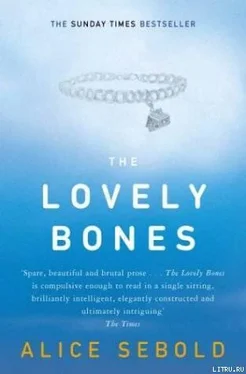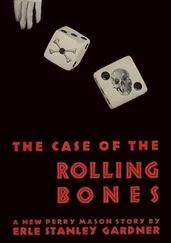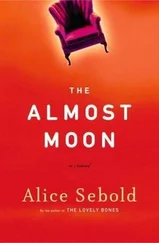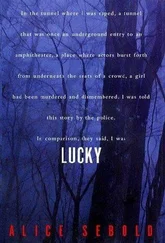By August, Len wanted to establish some boundaries for his sake and for my father’s. My father had called the precinct too many times and frustrated the police into irritation, which wouldn’t help anyone be found and just might make the whole place turn against him.
The final straw had been a call that came in the first week of July. Jack Salmon had detailed to the operator how, on a morning walk, his dog had stopped in front of Mr. Harvey’s house and started howling. No matter what Salmon had done, went the story, the dog wouldn’t budge from the spot and wouldn’t stop howling. It became a joke at the station: Mr. Fish and his Huckleberry Hound.
Len stood on the stoop of our house to finish his cigarette. It was still early, but the humidity from the day before had intensified. All week rain had been promised, the kind of thunder and lightning rainstorm the area excelled at, but so far the only moisture of which Len was aware was that covering his body in a damp sweat. He had made his last easy visit to my parents’ house.
Now he heard humming – a female voice from inside. He stubbed out his cigarette against the cement under the hedge and lifted the heavy brass knocker. The door opened before he let go.
“I smelled your cigarette,” Lindsey said.
“Was that you humming?”
“Those things will kill you.”
“Is your father home?”
Lindsey stood aside to let him in.
“Dad!” my sister yelled into the house. “It’s Len!”
“You were away, weren’t you?” Len asked.
“I just got back.”
My sister was wearing Samuel’s softball shirt and a pair of strange sweatpants. My mother had accused her of returning home without one single item of her own clothing.
“I’m sure your parents missed you.”
“Don’t bet on it,” Lindsey said. “I think they were happy to have me out of their hair.”
Len knew she was right. He was certainly sure my mother had seemed less frantic when he had visited the house.
Lindsey said, “Buckley’s made you the head of the police squad in the town he built under his bed.”
“That’s a promotion.”
The two of them heard my father’s footsteps in the hallway above and then the sounds of Buckley begging. Lindsey could tell that whatever he’d asked for our father had finally granted.
My father and brother descended the stairs, all smiles.
“Len,” he said, and he shook Len’s hand.
“Good morning, Jack,” Len said. “And how are you this morning, Buckley?”
My father took Buckley’s hand and stood him in front of Len, who solemnly bent down to my brother.
“I hear you’ve made me chief of police,” Len said.
“Yes sir.”
“I don’t think I deserve the job.”
“You more than anyone,” my father said breezily. He loved it when Len Fenerman dropped by. Each time he did, it verified for my father that there was a consensus – a group behind him – that he wasn’t alone in all this.
“I need to talk to your father, kids.”
Lindsey took Buckley back into the kitchen with the promise of cereal. She herself was thinking of what Samuel had shown her; it was a drink called a jellyfish, which involved a maraschino cherry at the bottom of some sugar and gin. Samuel and Lindsey had sucked the cherries up through the sugar and booze until their heads hurt and their lips were stained red.
“Should I get Abigail? Can I make you some coffee or something?”
“Jack,” Len said, “I’m not here with any news – just the opposite. Can we sit?”
I watched my father and Len head into the living room. The living room seemed to be where no living ever actually occurred. Len sat on the edge of a chair and waited for my father to take a seat.
“Listen, Jack,” he said. “It’s about George Harvey.”
My father brightened. “I thought you said you had no news.”
“I don’t. I have something I need to say on behalf of the station and myself.”
“Yes.”
“We need you to stop making calls about George Harvey.”
“But…”
“I need you to stop. There is nothing, no matter how much we stretch it, to connect him to Susie’s death. Howling dogs and bridal tents are not evidence.”
“I know he did it,” my father said.
“He’s odd, I agree, but as far as we know he isn’t a killer.”
“How could you possibly know that?”
Len Fenerman talked, but all my father could hear was Ruana Singh saying what she had to him, and of standing outside Mr. Harvey’s house and feeling the energy radiating out to him, the coldness at the core of the man. Mr. Harvey was at once unknowable and the only person in the world who could have killed me. As Len denied it, my father grew more certain.
“You are stopping your investigation of him,” my father said flatly.
Lindsey was in the doorway, hovering as she’d done on the day Len and the uniformed officer had brought my hat with the jingle bell, the twin of which she owned. That day she had quietly shoved this second hat into a box of old dolls in the back of her closet. She never wanted my mother to hear the sound of those beadlike bells again.
There was our father, the heart we knew held all of us. Held us heavily and desperately, the doors of his heart opening and closing with the rapidity of stops on an instrument, the quiet felt closures, the ghostly fingering, practice and practice and then, incredibly, sound and melody and warmth. Lindsey stepped forward from her place by the door.
“Hello again, Lindsey,” Len said.
“Detective Fenerman.”
“I was just telling your father…”
“That you’re giving up.”
“If there was any good reason to suspect the man…”
“Are you done?” Lindsey asked. She was suddenly the wife to our father, as well as the oldest, most responsible child.
“I just want you all to know that we’ve investigated every lead.”
My father and Lindsey heard her, and I saw her. My mother coming down the stairs. Buckley raced out of the kitchen and charged, propelling his full weight into my father’s legs.
“Len,” my mother said, pulling her terry-cloth robe tighter when she saw him, “has Jack offered you coffee?”
My father looked at his wife and Len Fenerman.
“The cops are punting,” Lindsey said, taking Buckley gently by the shoulders and holding him against her.
“Punting?” Buckley asked. He always rolled a sound around in his mouth like a sourball until he had its taste and feel.
“What?”
“Detective Fenerman is here to tell Dad to stop bugging them.”
“Lindsey,” Len said, “I wouldn’t put it like that.”
“Whatever,” she said. My sister wanted out, now, into a place where gifted camp continued, where Samuel and she, or even Artie, who at the last minute had won the Perfect Murder competition by entering the icicle-as-murder-weapon idea, ruled her world.
“Come on, Dad,” she said. My father was slowly fitting something together. It had nothing to do with George Harvey, nothing to do with me. It was in my mother’s eyes.
That night, as he had more and more often, my father stayed up by himself in his study. He could not believe the world falling down around him – how unexpected it all was after the initial blast of my death. “I feel like I’m standing in the wake of a volcano eruption,” he wrote in his notebook. “Abigail thinks Len Fenerman is right about Harvey.”
As he wrote, the candle in the window kept flickering, and despite his desk lamp the flickering distracted him. He sat back in the old wooden school chair he’d had since college and heard the reassuring squeak of the wood under him. At the firm he was failing to even register what was needed of him. Daily now he faced column after column of meaningless numbers he was supposed to make square with company claims. He was making mistakes with a frequency that was frightening, and he feared, more than he had in the first days following my disappearance, that he would not be able to support his two remaining children.
Читать дальше












